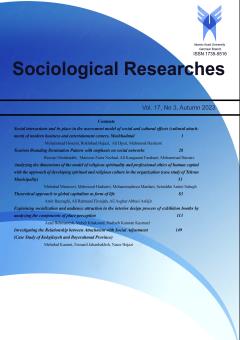An analysis of the tourism destination branding model with an emphasis on social networks with a sociological approach
Subject Areas :Rezvan Omidzadeh 1 * , Mansour Zarra Nezhad 2 , Ali Kangarani Farahani 3 , Mohammad Hemati 4
1 - Ph.D. Student in Marketing Management, Faculty of Management, Ahvaz branch, Islamic Azad University, Ahvaz, Iran
2 - Professor of Management, Ahvaz branch, Islamic Azad University, Ahvaz, Iran
3 - Assistant Professor of Management, Ahvaz branch, Islamic Azad University, Ahvaz, Iran.
4 - Associate Professor of Management, Semnan branch, Islamic Azad University, Semnan, Iran.
Keywords: branding, tourism, social networks, sociological,
Abstract :
Tourism as an effective and influencing industry has been able to attract the attention of policy makers and planners. This industry is a broad activity that brings with it important economic, social, cultural and environmental effects, and each can be discussed in its place.The purpose of this research was to analyze the pattern of tourism destination branding with an emphasis on social networks with a sociological approach. The research method is a qualitative case study and the participants are elites. By using the purposeful sampling method and theoretical saturation technique, key informants (including 16 people) were selected to identify the framework of the research model and interviews were conducted with them. The tool used to identify the factors of the research model is a semi-structured interview. (with focus groups) and the study of documents. To ensure validity and reliability of the study, the assessment method of Linuklen and Goba was used. The paradigm model of this research was designed based on the paradigm model of Strauss and Corbin. After conducting research interviews, there were 43 codes. It was determined in general. Table 2 shows the results related to these codes. According to the results of the present research, it was determined that the variables influencing tourism destination branding include audience attraction, sustainable development, brand knowledge, regional needs, and support. Localization, public trust and human resource management and individual and group interactions.

